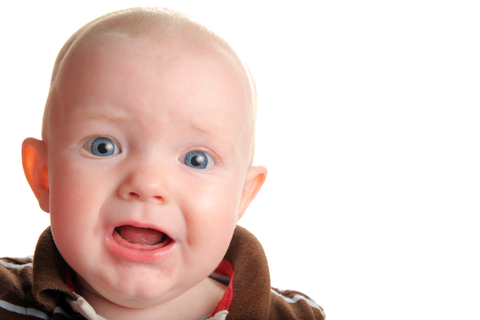
One of the questions we hear often is: “Won’t cloth diapers leak?” Of course, any diaper could leak, so we help our customers choose and care for their diapers properly to avoid the dreaded blow out or the wet bed.
With any diaper, you need to consider these issues to be sure that you have no leaks:
- the diaper needs to fit well,
- quality design and materials really does matter,
- overnight calls for extra absorbency, and
- sometimes laundry issues can cause problems.
Does size really matter that much when diapers are all one-sized? Size does matter. You need to choose a diaper that fits your baby’s size and shape.
We still focus on fit even when a lot of the diapers we sell are one-sized diapers. Most newborns will not fit well in so-called one-size diapers. Tiny legs don’t block leg openings. When a diaper is too big, a baby will pee right out the leg opening. Even if you plan to use one-size diapers, it helps to start with newborn cloth diapers.
Sometimes the issue isn’t size but shape. Even a bigger baby with skinny legs will need a diaper that has adjustable sizing for legs to prevent leaks. If a diaper slips down on a baby with a low waist, you end up with gaps at the legs. Choose a low-rise diaper to prevent gaps.
Also, check to be sure that the absorbent part of the diaper isn’t sticking out. If that happens, it could act like a wick drawing all of the moisture out of your baby’s diaper onto clothes and bed. At the end of a diaper change, check and tuck to be sure that the diaper is completely inside the cover.
Your baby’s size and shape do matter. We have experience with a variety of styles, sizes, and brands, so we can help you find the best fit to keep those little legs dry.
Aren’t all diapers pretty much the same? We see a big difference in the quality of cloth diapers. Quality does matter. When a family has been using cheap knock-off diapers and we introduce them to the real thing, they are amazed at the difference quality can make.
Sometimes the issue with leaking is design. Brands that have been around for a while have had time to incorporate customer feedback into their designs, adjusting the shape of a diaper for maximum wetness protection.
Other times, the issue with leaking is materials. A surprising number of inexpensive diapers include no absorbent materials at all. We sometimes wonder if these products have ever been tested for absorbency because they just don’t work as well as we expect.
Quality diapers have good reputations, and they are invested in your diapering success. We only carry quality brands we trust. Look for customer ratings and reviews to learn what works for other families.
How can I avoid leaky nighttime diapers? The key to a dry bed overnight is using enough absorbency.
Even if your baby seems to be sleeping through the night, it’s likely s/he is waking once or twice to pee without being so fussy that you wake up. That’s a lot of moisture to expect a diaper to hold until morning.
If you find that your baby’s diapers leak by morning, start by doubling up the absorbent part of the diaper. Add a second prefold or an extra insert, for example.
For heavy nighttime wetters, we recommend hemp boosters because the fibers are very absorbent. Because they are so absorbent, they hang on to water in the wash, and they are more difficult to clean well, so just be sure that you use hot water and plenty of rinses to keep hemp from getting stinky.
Why does my baby pee right out of the diaper? If urine flows right off the diaper without even being absorbed, you likely have an issue with laundry.
Oily residues on on any diaper material can cause the material to repel rather than absorb. This residue can come from diaper cream, fabric softener, even build-up from detergents that haven’t been rinsed properly. This is usually more of a problem with polyester diapers, but it can happen with any diaper if there is enough oily residue.
We are happy to help our customers troubleshoot laundry issues. Come in or call to tell us how we can help.
If the problem was diaper cream, be sure that the diaper cream you choose is safe for cloth diapers. Even then, you can prevent issues with your diapers by using a diaper liner.
If your natural fiber diapers are new, you do need to pre-wash several times until they are fully absorbent. If your new cotton prefolds are leaking, the fix is easy: wash 3-5 times on hot, and you are ready to go.
Occasionally, a diaper will leak. When that happens, figure out why, and you can prevent it from happening every time.
Cloth Diapering Basics
This month we’re covering our answers to common questions and comments that we get in the bynature.ca store about cloth diaper 101 basics, like “I can’t afford cloth diapers,” “I don’t have time for cloth diapers,” and “Aren’t cloth diapers gross?” What! We’ve got the answers.
Image © Scott Van Blarcom | Dreamstime.com
